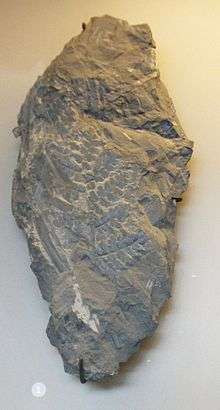Sphenopteris
Sphenopteris is a genus of seed ferns containing the foliage of various extinct plants, ranging from the Devonian to Late Cretaceous.[1][2]
| Sphenopteris | |
|---|---|
 | |
| S. schumannii specimen on display at Musée d'Histoire Naturelle de Lille | |
| Scientific classification | |
| Kingdom: | Plantae |
| Clade: | Tracheophytes |
| Division: | †Pteridospermatophyta |
| Class: | †Lyginopteridopsida |
| Order: | †Lyginopteridales |
| Family: | †Lyginopteridaceae |
| Genus: | †Sphenopteris Sternberg 1825 |
| Species | |
| |
Distribution
In Brazil, fossil of form genus Sphenopteris was located in outcrop Morro Papalé in the city of Mariana Pimentel. They are in the geopark Paleorrota in Rio Bonito Formation and date from Sakmarian in Permian.[3] Fossils of Sphenopteris have also been found in the Valle Alto Formation, Caldas, Colombia, among many other locations.[4]
gollark: I like to be able to access Discord and random websites and RSS feeds on the go, too.
gollark: I guess you could do that, but I would find it inconvenient personally.
gollark: Some of them have better batteries and cameras and ACTUALLY HAVE HEADPHONE JACKS and whatnot.
gollark: When I was looking for a replacement phone I mostly just used this nice search tool (https://www.gsmarena.com/search.php3?) to look for ones satisfying my requirements.
gollark: Not really, I don't like the current state of the phone market much.
References
- Palmer, Douglas; et al. (2009). Prehistoric Life: The Definitive Visual History of Life on Earth (1st American ed.). New York: Dorling Kindersley. p. 149. ISBN 978-0-7566-5573-0.
- Manuscript entitled, Fossil Flora and Fauna of the Pennsylvanian Period, Will County, Illinois
- Afloramento Morro do Papaléo, Mariana Pimentel, RS
- Sphenopteris at Fossilworks.org
This article is issued from Wikipedia. The text is licensed under Creative Commons - Attribution - Sharealike. Additional terms may apply for the media files.